八年级上册英语unit1知识点整理
- 格式:docx
- 大小:27.47 KB
- 文档页数:13
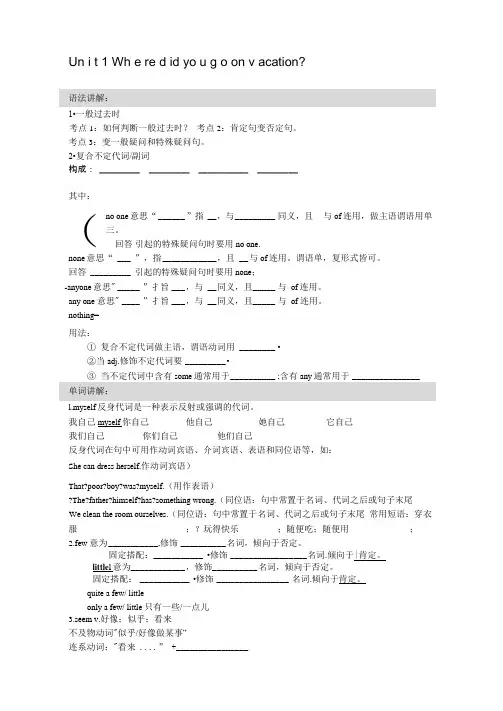
Un i t 1 Wh e re d id yo u g o on v acation?1•一般过去时考点1:如何判断一般过去时?考点2:肯定句变否定句。
考点3:变一般疑问和特殊疑问句。
2•复合不定代词/副词构成: _________ _________ ___________ _________其中:(no one意思“______ ”指 __ ,与_________ 同义,且与of连用,做主语谓语用单三。
回答引起的特殊疑问句时要用no one.none意思“ ___ ”,指____________ ,且 __ 与of连用。
谓语单,复形式皆可。
回答 _________ 引起的特殊疑问句时要用none;-anyone意思" _____ ”扌旨___ ,与 __ 同义,且_____ 与of连用。
_any one 意思" ____ ”扌旨___ ,与 __ 同义,且_____ 与of 连用。
nothing= _________________用法:① 复合不定代词做主语,谓语动词用 ________ •②当adj.修饰不定代词要_________ •③ 当不定代词中含有some通常用于__________ ;含有any通常用于_______________我自己myself你自己他自己她自己它自己我们自己你们自己他们自己反身代词在句中可用作动词宾语、介词宾语、表语和同位语等,如:She can dress herself.作动词宾语)That?poor?boy?was?myself.(用作表语)Thefatherhimselfhassomething wrong.(同位语:句中常置于名词、代词之后或句子末尾We clean the room ourselves.(同位语:句中常置于名词、代词之后或句子末尾常用短语:穿衣服;?玩得快乐;随便吃;随便用;2.few 意为___________,修饰__________ 名词,倾向于否定。
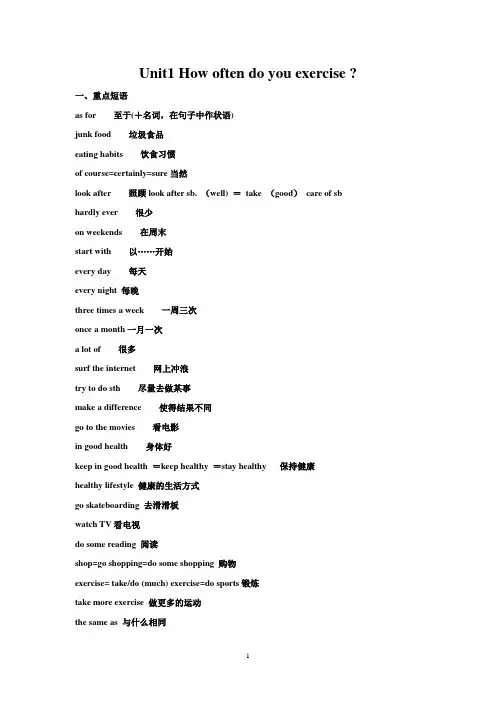
Unit1 How often do you exercise ?一、重点短语as for 至于(+名词,在句子中作状语)junk food 垃圾食品eating habits 饮食习惯of course=certainly=sure当然look after 照顾look after sb. (well) =take (good)care of sb hardly ever 很少on weekends 在周末start with 以……开始every day 每天every night 每晚three times a week 一周三次once a month一月一次a lot of 很多surf the internet 网上冲浪try to do sth 尽量去做某事make a difference 使得结果不同go to the movies 看电影in good health 身体好keep in good health =keep healthy =stay healthy 保持健康healthy lifestyle 健康的生活方式go skateboarding 去滑滑板watch TV看电视do some reading 阅读shop=go shopping=do some shopping 购物exercise= take/do (much) exercise=do sports锻炼take more exercise 做更多的运动the same as 与什么相同be different from 不同make a difference to 对什么有影响most of the students=most students大多数学生activity survey活动调查do homework做家庭作业do housework做家务事eat less meat吃更少的肉be good for 对什么有益be good for one's health 有益健康be bad for对什么有害want to do sth 想做某事want sb to do sth想某人做某事come home from school放学回家get good grades取得好成绩some advice 一些建议(advice 是不可数名词 a piece of advice 一则建议give advice 提出建议take one’s advice 采纳或听从某人的建议)help sb to do sth帮助某人做某事=help sb with sthhardly= almost not几乎不hardly ever很少,几乎不,从不your favorite program你最喜欢的节目Animal World 动物世界play soccer踢足球the result of a survey 调查结果the result for “watch TV”“看电视”的调查结果improve your English 提高你的英语drink milk 喝牛奶pretty healthy 相当健康kind of = a little 有点(I think I’m kind of unhealthy.我想我有点不健康)①Sometimes 偶尔,有时;some times 一些次数;sometime未来某时;some time一些时间。
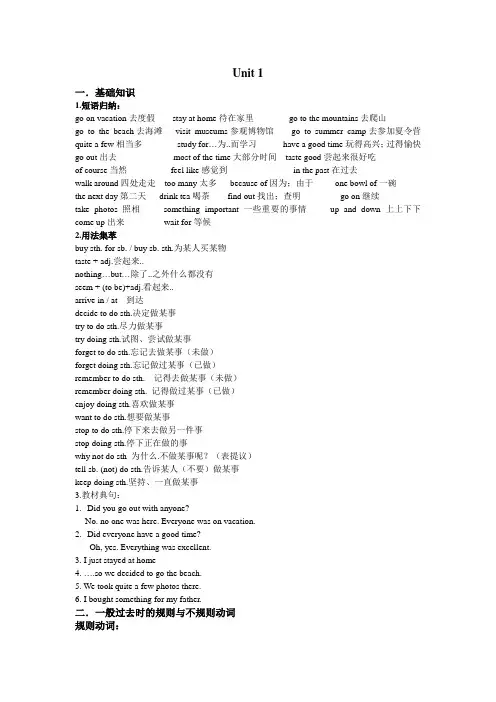
Unit 1一.基础知识1.短语归纳:go on vacation去度假stay at home待在家里go to the mountains去爬山go to the beach去海滩visit museums参观博物馆go to summer camp去参加夏令营quite a few相当多study for…为..而学习have a good time玩得高兴;过得愉快go out出去most of the time大部分时间taste good尝起来很好吃of course当然feel like感觉到in the past在过去walk around四处走走too many太多because of因为;由于one bowl of一碗the next day第二天drink tea喝茶find out找出;查明go on继续take photos照相something important一些重要的事情up and down上上下下come up出来wait for等候2.用法集萃buy sth. for sb. / buy sb. sth.为某人买某物taste + adj.尝起来..nothing…but…除了..之外什么都没有seem + (to be)+adj.看起来..arrive in / at 到达decide to do sth.决定做某事try to do sth.尽力做某事try doing sth.试图、尝试做某事forget to do sth.忘记去做某事(未做)forget doing sth.忘记做过某事(已做)remember to do sth. 记得去做某事(未做)remember doing sth. 记得做过某事(已做)enjoy doing sth.喜欢做某事want to do sth.想要做某事stop to do sth.停下来去做另一件事stop doing sth.停下正在做的事why not do sth 为什么.不做某事呢?(表提议)tell sb. (not) do sth.告诉某人(不要)做某事keep doing sth.坚持、一直做某事3.教材典句:1.--Did you go out with anyone?--No. no one was here. Everyone was on vacation.2.--Did everyone have a good time?--Oh, yes. Everything was excellent.3. I just stayed at home4. ….so we decided to go the beach.5. We took quite a few photos there.6. I bought something for my father.二.一般过去时的规则与不规则动词规则动词:一般动词直接加—ed watch—watched以字母e结尾的规则动词只加—d loved; lived; arrived 以辅音字母加y 结尾的动词变y为i 再加—ed studied; cried; worried重读闭音节结尾的动词,末尾只有一个辅音字母双写辅音字母再加—ed stop--stopped 不规则动词:动词的过去式和原形一样:put—put; let—let; read—read; cut—cut;遇见i 变a:swim—swam; sing—sang; begin—began; sit—sat; give—gave; drink—drank;过去式以ought和aught结尾的单词:bring—brought; buy—bought; think—thought; catch—caught; teach—taught;中间去e末尾加t: feel—felt; keep—kept; sleep—slept; sweep—swept; meet—met; feed—fed; 把i 变为o: ride—rode; drive—drove; write—wroteow/ aw变为ew: know—knew; grow—grew; throw—threw; draw—drew;以d结尾的词,把d变为t: build—built; lend—lent; send—sent; spend--spent。
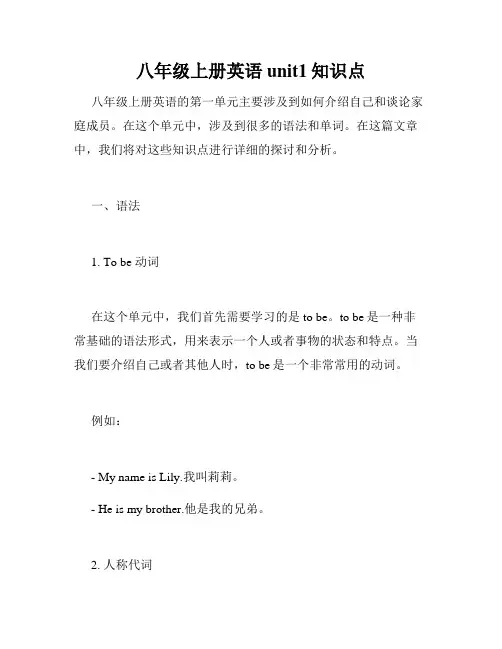
八年级上册英语unit1知识点八年级上册英语的第一单元主要涉及到如何介绍自己和谈论家庭成员。
在这个单元中,涉及到很多的语法和单词。
在这篇文章中,我们将对这些知识点进行详细的探讨和分析。
一、语法1. To be 动词在这个单元中,我们首先需要学习的是to be。
to be是一种非常基础的语法形式,用来表示一个人或者事物的状态和特点。
当我们要介绍自己或者其他人时,to be是一个非常常用的动词。
例如:- My name is Lily.我叫莉莉。
- He is my brother.他是我的兄弟。
2. 人称代词人称代词也是这个单元中需要学习的一个重要知识点。
人称代词是用来代替人名的一种词语,用来简化句子结构。
例如:- I am a student.我是一名学生。
- She is happy.她很开心。
- They are our friends.他们是我们的朋友。
3. 形容词形容词是用来描述人或事物特点的一种词语。
在这个单元中,我们需要学习一些常见的形容词,如happy、smart、young等等。
例如:- She is smart.她很聪明。
- He is young.他很年轻。
- I am happy.我很开心。
4. 名词名词也是这个单元中需要学习的一个重要知识点。
名词是用来表示人、事物、地点或者概念的一种词语。
通常情况下,名词在句子中作为主语、宾语或补语。
例如:- My father is a teacher.我父亲是一名老师。
- Beijing is the capital of China.北京是中国的首都。
- English is an important language.英语是一种重要的语言。
二、单词1. 人称代词人称代词是to be动词和其他动词中最常使用的一种词语。
在介绍自己或者其他人时非常常用。
例如:- My name is Tom.我叫汤姆。
- She is my sister.她是我的姐姐。
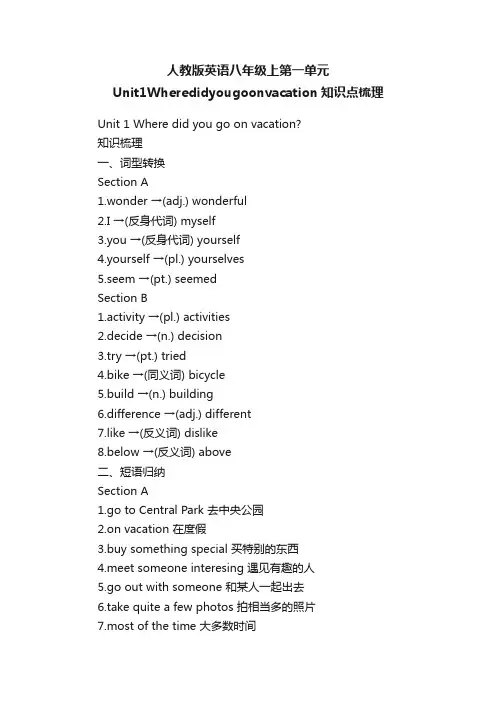
人教版英语八年级上第一单元Unit1Wheredidyougoonvacation知识点梳理Unit 1 Where did you go on vacation?知识梳理一、词型转换Section A1.wonder →(adj.) wonderful2.I →(反身代词) myself3.you →(反身代词) yourself4.yourself →(pl.) yourselves5.seem →(pt.) seemedSection B1.activity →(pl.) activities2.decide →(n.) decision3.try →(pt.) tried4.bike →(同义词) bicycle5.build →(n.) building6.difference →(adj.) different7.like →(反义词) dislike8.below →(反义词) above二、短语归纳Section A1.go to Central Park 去中央公园2.on vacation 在度假3.buy something special 买特别的东西4.meet someone interesing 遇见有趣的人5.go out with someone 和某人一起出去6.take quite a few photos 拍相当多的照片7.most of the time 大多数时间8.go shopping 去购物9.keep a diary 记日记10.of course 当然;自然Section B1.have a good time 玩得高兴;过得愉快2.go to the beach 去海滩3.feel like 感觉像4.the houses of the Chinese traders 中国商人的房子5. a lot of new buildings 许多新的建筑物6.in the past 在过去7.over an hour 一个多小时8.too many people 太多的人9.get to the top 到达顶部10.because of the bad weather 因为不好的天气11.one bowl of fish 一碗鱼肉12.another two hours 另外两个小时13.the top of the hill 山顶14.learn something important 学习重要的东西Self Check1.go to the countryside 去乡下2.in the shopping center 在购物中心3.have a fun time 玩得高兴;过得愉快4.after three hours 三个小时以后5.keep going 一直走6.twenty minutes later 20分钟后重点句子1.Where did you go on vacation?你去哪儿度假的?2.Long time no see.好久不见。
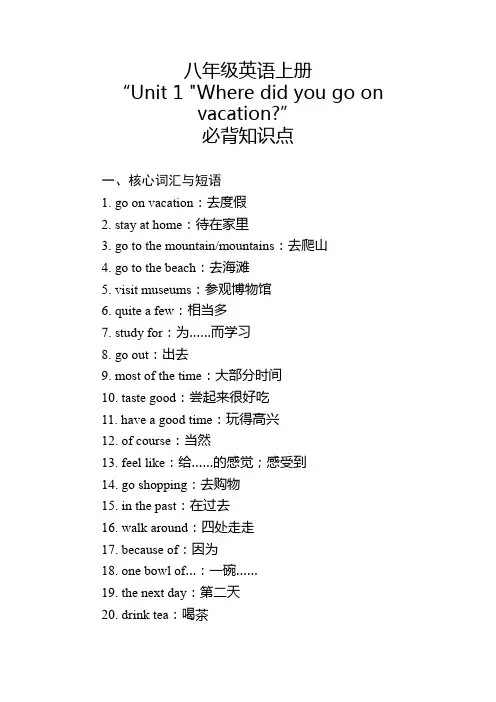
八年级英语上册“Unit 1 "Where did you go onvacation?”必背知识点一、核心词汇与短语1. go on vacation:去度假2. stay at home:待在家里3. go to the mountain/mountains:去爬山4. go to the beach:去海滩5. visit museums:参观博物馆6. quite a few:相当多7. study for:为……而学习8. go out:出去9. most of the time:大部分时间10. taste good:尝起来很好吃11. have a good time:玩得高兴12. of course:当然13. feel like:给……的感觉;感受到14. go shopping:去购物15. in the past:在过去16. walk around:四处走走17. because of:因为18. one bowl of…:一碗……19. the next day:第二天20. drink tea:喝茶21. find out:找出;查明22. take photos:照相23. something important:重要的事二、重点句型与结构1. 询问过去的行动:Where did you go on vacation? 你假期去哪里了?What did you do last weekend? 上周末你做了什么?2. 回答过去的行动:I went to the mountains. 我去爬山了。
We visited the museum. 我们参观了博物馆。
3. 描述过去的感受或状态:It was wonderful. 太棒了。
I felt like I was a bird. 我感觉自己像一只鸟。
4. 表示过去的频率或习惯:I usually went shopping with my mom. 我通常和我妈妈一起去购物。
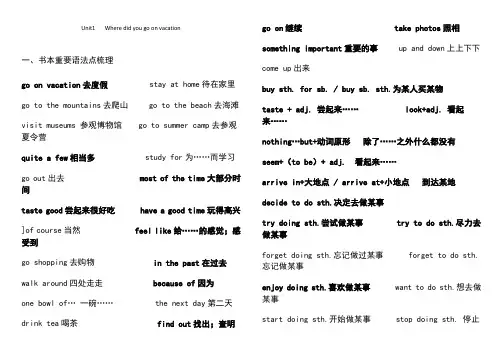
Unit1 Where did you go on vacation一、书本重要语法点梳理go on vacation去度假 stay at home待在家里go to the mountains去爬山 go to the beach去海滩visit museums 参观博物馆 go to summer camp去参观夏令营quite a few相当多 study for为……而学习go out出去most of the time大部分时间taste good尝起来很好吃 have a good time玩得高兴]of course当然feel like给……的感觉;感受到go shopping去购物in the past在过去walk around四处走走because of因为one bowl of…一碗…… the next day第二天drink tea喝茶find out找出;查明go on继续 take photos照相something important重要的事 up and down上上下下come up出来buy sth. for sb. / buy sb. sth.为某人买某物taste + adj. 尝起来…… look+adj. 看起来……nothing…but+动词原形除了……之外什么都没有seem+(to be)+ adj. 看起来……arrive in+大地点 / arrive at+小地点到达某地decide to do sth.决定去做某事try doing sth.尝试做某事 try to do sth.尽力去做某事forget doing sth.忘记做过某事 forget to do sth.忘记做某事enjoy doing sth.喜欢做某事 want to do sth.想去做某事start doing sth.开始做某事 stop doing sth. 停止做某事dislike doing sth. 不喜欢做某事keep doing sth.继续做某事Why not do. sth.为什么不做……呢so+adj.+that+从句如此……以至于……tell sb. (not) to do sth. 告诉某人(不要)做某事1. on vacation 度假vacation意为“假期、假日”,相当于holiday,但vacation 表示长的假期。
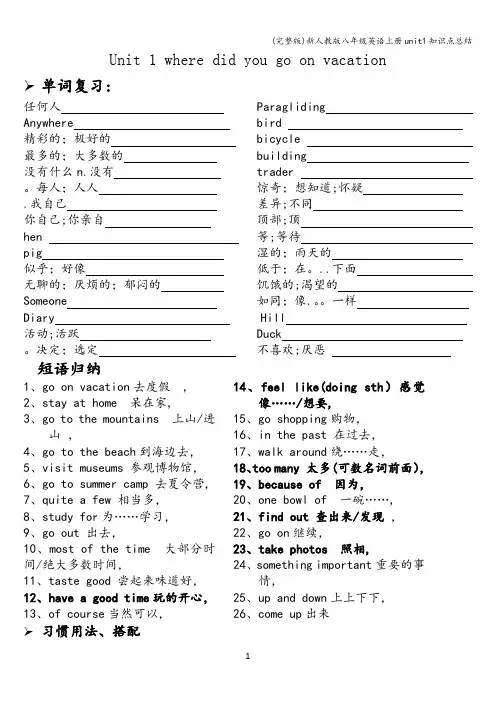
Unit 1 where did you go on vacation ➢单词复习:任何人Anywhere 精彩的;极好的最多的;大多数的没有什么n.没有。
每人;人人.我自己你自己;你亲自hen pig似乎;好像无聊的;厌烦的;郁闷的Someone Diary 活动;活跃。
决定;选定Paragliding bird bicycle building trader惊奇;想知道;怀疑差异;不同顶部;顶等;等待湿的;雨天的低于;在。
..下面饥饿的;渴望的如同;像.。
一样HillDuck不喜欢;厌恶短语归纳1、go on vacation去度假 ,2、stay at home 呆在家,3、go to the mountains 上山/进山,4、go to the beach到海边去,5、visit museums 参观博物馆,6、go to summer camp 去夏令营,7、quite a few 相当多,8、study for为……学习,9、go out 出去,10、most of the time 大部分时间/绝大多数时间,11、taste good 尝起来味道好,12、have a good time玩的开心,13、of course当然可以,14、feel like(doing sth)感觉像……/想要,15、go shopping购物,16、in the past 在过去,17、walk around绕……走,18、too many 太多(可数名词前面),19、because of 因为,20、one bowl of 一碗……,21、find out 查出来/发现,22、go on继续,23、take photos 照相,24、something important重要的事情,25、up and down上上下下,26、come up出来➢习惯用法、搭配1. buy sth。
for sb.=buy sb. sth。
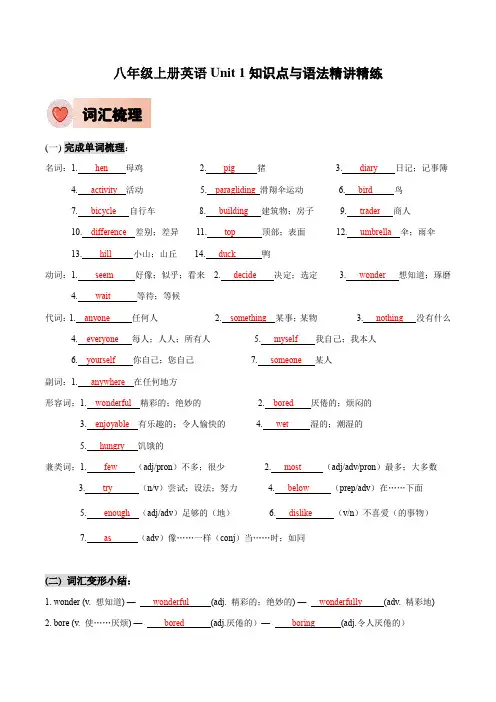
八年级上册英语Unit 1知识点与语法精讲精练词汇梳理(一)完成单词梳理:名词:1. hen母鸡 2. pig 猪 3. diary 日记;记事簿4. activity 活动5. paragliding 滑翔伞运动6. bird 鸟7. bicycle 自行车8. building 建筑物;房子9. trader 商人10. difference 差别;差异11. top 顶部;表面12. umbrella 伞;雨伞13. hill 小山;山丘14. duck 鸭动词:1. seem 好像;似乎;看来 2. decide 决定;选定 3. wonder 想知道;琢磨4. wait 等待;等候代词:1. anyone 任何人 2. something 某事;某物 3. nothing 没有什么4. everyone 每人;人人;所有人5. myself 我自己;我本人6. yourself 你自己;您自己7. someone 某人副词:1. anywhere 在任何地方形容词:1. wonderful 精彩的;绝妙的 2. bored 厌倦的;烦闷的3. enjoyable 有乐趣的;令人愉快的4. wet 湿的;潮湿的5. hungry 饥饿的兼类词:1. few (adj/pron)不多;很少 2. most (adj/adv/pron)最多;大多数3. try (n/v)尝试;设法;努力4. below (prep/adv)在……下面5. enough (adj/adv)足够的(地)6. dislike (v/n)不喜爱(的事物)7. as (adv)像……一样(conj)当……时;如同(二) 词汇变形小结:1. wonder (v. 想知道) — wonderful (adj. 精彩的;绝妙的) — wonderfully (adv. 精彩地)2. bore (v. 使……厌烦) — bored (adj.厌倦的)— boring (adj.令人厌倦的)3. diary (n. 日记) — diaries (复数)4. enjoy (v. 喜爱) — enjoyable (adj. 有乐趣的;令人愉快的)5. activity (n. 活动) — activities (复数)6. decide (v. 决定) — decision (n. 决定)7. build (v. 建造) — building (n. 建筑物;房子)8.trade (n/v贸易;买卖) — trader (n. 商人)9. difference (n. 差别;差异) — different (adj. 不同的)10. wait(v. 等候;等待) — waiter (n. 男服务员) — waitress (n. 女服务员)11. like(v. 喜欢)— dislike 反义词(v.不喜欢)【练一练】用所给词的适当形式填空1.–Mom. I plan to wash clothes by ___myself____(I) this summer vacation.- Good girl! Go for it.2.Can you tell me some __differences___(different) between the two pictures?3.The students have quite a few activities (activity) after class. They can sing, dance and play basketball.4.I think it will be a very enjoyable (enjoy) trip for you to travel to Beijing.5.His cousin is a trader (trade), selling fruit and vegetables.6.The TV show is really boring (bore). I don’t want to watch it.7.As a teacher, Mr. Green always tries to make his lessons _enjoyable__(enjoy).8.This film is _wonderful___ (wonder). I like to see it very much.9.I can look after __myself____(my). Don’t worry about me.10.You must look after __yourself____(you) well while I'm away, Tom.(三) 短语攻关:go on vacation去度假stay at home 待在家里go out 出去quite a few 相当多;不少most of the time大部分时间of course当然have a good time=enjoy oneself 玩得高兴feel like 给……的感觉;感觉像take photos 拍照;照相keep a diary 写日记buy sth for sb 买某物给某人decide to do sth 决定做某事something important 重要的事find out 找出;查明in the past 在过去make a difference 产生影响;起作用enjoy doing sth喜欢做某事too many 太多arrive at/in 到达because of 因为;由于wait for 等待;等候start to do /doing sth开始做某事知识点梳理1.We took a few photos there.我们在那里拍了很多照片。
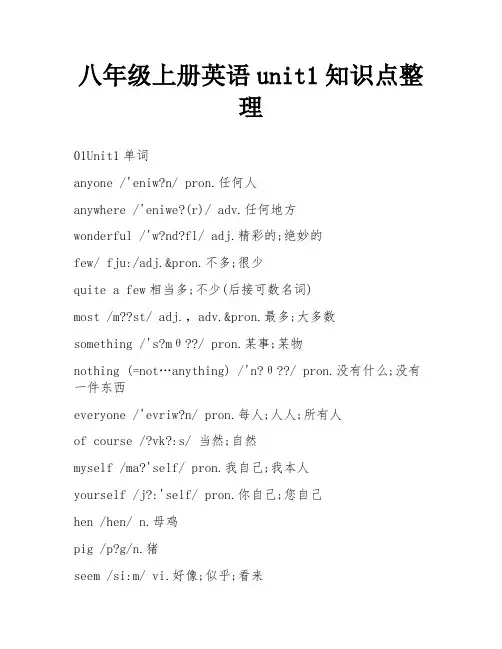
八年级上册英语unit1知识点整理01Unit1单词anyone /'eniw?n/ pron.任何人anywhere /'eniwe?(r)/ adv.任何地方wonderful /'w?nd?fl/ adj.精彩的;绝妙的few/ fju:/adj.&pron.不多;很少quite a few相当多;不少(后接可数名词)most /m??st/ adj.,adv.&pron.最多;大多数something /'s?mθ??/ pron.某事;某物nothing (=not…anything) /'n?θ??/ pron.没有什么;没有一件东西everyone /'evriw?n/ pron.每人;人人;所有人of course /?vk?:s/ 当然;自然myself /ma?'self/ pron.我自己;我本人yourself /j?:'self/ pron.你自己;您自己hen /hen/ n.母鸡pig /p?g/n.猪seem /si:m/ vi.好像;似乎;看来bored /b?:d/ adj.厌倦的;烦闷的someone /'s?mw?n/ pron.某人diary /'da??ri/ n.日记;日记簿(keep a diary)activity /?k't?v?ti/ n.活动decide /d?'sa?d/ v.决定;选定(decide to do sth.)try /tra?/ v.尝试;设法;努力 (try to do sth. /try doing sth.)paragliding /'p?r?ɡla?d??/ n.空中滑翔跳伞feel like 给……的感觉;感受到bird /b?:d/ n.鸟bicycle /'ba?s?kl/ n.自行车;脚踏车building /'b?ld??/ n.建筑物;房子trader /'tre?d?(r)/ n.商人wonder /'w?nd?(r)/ v.想知道;琢磨difference /'d?fr?ns/ n.差别;差异top /t?p/ n.顶部;表面wait /we?t/ v.等待;等候(wait for)umbrella /?m'brel?/ n.伞;雨伞wet /wet/ adj.湿的;雨天的because of因为below /b?'l??/ prep.&adv.在……下面;到……下面enough /?'n?f/ adj.足够的(地)adv.充足的(地);充分的(地) hungry /'h??ɡri/ adj.饥饿的as /?z/ conj.像……一样;如同hill /h?l/ n.小山;山丘duck /d?k/ n.鸭dislike /d?s'la?k/v.&n.不喜爱(的事物);厌恶(的事物) Central Park 中央公园(美国纽约) HuangguoshuWarterfall /'w?:t?(r)f?:l/ 黄果树瀑布(贵州)HongKong /,h??'k??/,/'ha:?,ka:?/香港(中华人民共和国特别行政区)Malaysia /m?'le/马来西亚;Malaysian /m?'le??n/adj.马来西亚的;n.马来西亚人; Georgetown /?d??:d?ta?n/乔治市(马来西亚)Weld /weld/ Quay /ki:/ 海墘街Penang /p??n??/ Hill 槟城山(马来西亚)Tian'anmen Square /skwe?/,/skwer/天安门广场the Palace /?p?l?s/ Museum 故宫博物院Mark /mɑ:(r)k/马克(男名)02Unit1知识梳理Unit1. Where did you go on vacation?【重点短语】1. go on vacation 去度假2. stay at home 呆在家3. go to the mountains 上山/进山4. go to the beach 到海边去5. visit museums 参观博物馆6. go to the summer camp 去夏令营7. quite a few 相当多8. study for为…… 学习,9. go out 出去10. most of the time 大部分时间/绝大多数时间11. taste good 尝起来味道好12. have a good time 玩的开心13. of course 当然可以14. feel like 感觉像……/想要15. go shopping 去购物16. in the past 在过去17. walk around 绕……走18. too many 太多(可数名词前面)19. because of 因为20. one bowl of 一碗……21. find out 查出来/发现22. go on 继续23. take photos 照相24. something important 重要的事情25. up and down 上上下下26. e up 出来【重点句型】1. —Where did you go on vacation? 你到哪里去度假了?—I went to New York City. 我去了纽约城。
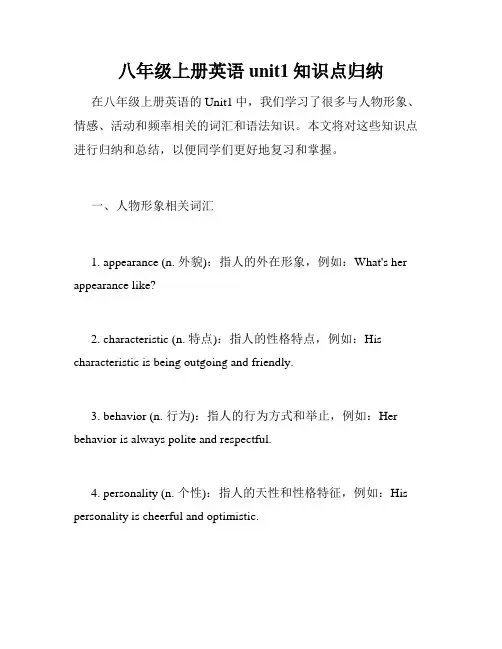
八年级上册英语unit1知识点归纳在八年级上册英语的Unit1中,我们学习了很多与人物形象、情感、活动和频率相关的词汇和语法知识。
本文将对这些知识点进行归纳和总结,以便同学们更好地复习和掌握。
一、人物形象相关词汇1. appearance (n. 外貌):指人的外在形象,例如:What's her appearance like?2. characteristic (n. 特点):指人的性格特点,例如:His characteristic is being outgoing and friendly.3. behavior (n. 行为):指人的行为方式和举止,例如:Her behavior is always polite and respectful.4. personality (n. 个性):指人的天性和性格特征,例如:His personality is cheerful and optimistic.5. occupation (n. 职业):指人的职业,例如:What's your occupation?二、情感相关词汇1. feeling (n. 感觉):指人的感觉和情感,例如:I have a good feeling about this.2. emotion (n. 情感):指更强烈的感情反应,例如:The news filled her with emotions of happiness and relief.3. mood (n. 心情):指人的心情状态,例如:What mood are you in today?4. express (v. 表达):指用语言、动作等方式表达情感或思想,例如:He expressed his gratitude to the team.5. attitude (n. 态度):指个体对事物的看法和评价,例如:His attitude towards the assignment was positive.三、活动相关词汇1. relax (v. 放松):指缓解压力或紧张状态,例如:I like to relax by taking a hot bath.2. exercise (n. 锻炼):指身体运动,例如:Regular exercise is good for your health.3. hobby (n. 爱好):指喜欢的活动或娱乐方式,例如:My hobby is reading.4. entertainment (n. 娱乐):指各种形式的娱乐活动,例如:Cinema is a great form of entertainment.5. travel (v. 旅游):指外出旅行,例如:I love to travel to different countries.四、频率相关词汇1. sometimes (adv. 有时):指在某些时间发生或出现,例如:I sometimes forget to do my homework.2. often (adv. 经常):指发生的频率比较高,例如:I often go swimming on weekends.3. rarely (adv. 很少):指极少数的频率,例如:I rarely eat fast food.4. always (adv. 总是):指经常发生或持续存在,例如:I always wake up early in the morning.5. never (adv. 从不):指完全不发生,例如:I never drink coffee before sleeping.五、语法知识1. 一般现在时:表达现在的事实和习惯,例如:I often go to the gym.2. 现在进行时:表达正在进行的动作,例如:She is reading a book.3. 物主代词:表示所有者或归属关系,例如:That book is mine.4. 介词短语:表示时间、地点、方式等词语的组合,例如:I study English in the library.5. 比较级:表示两个事物之间的比较关系,例如:My car is faster than yours.综上,八年级上册英语Unit1的知识点涵盖了人物形象、情感、活动和频率等方面的词汇和语法知识。
Unit1 Topic1一,词组:1,打算做某事be going to do 2,see sb do sth看见某人经常做某事3, see sb doing sth看到某人正在做某事4,during the summer holiday在暑假期间5,have a basketball game举办一场篮球赛6,cheer sb on为.....加油7,practice doing sth练习做某事8, prefer doing sth更喜欢做某事9,join in=take part in=be in参加....活动10,know about了解,知道11,grow up长大成人12,quite a lot相当多13,go skating去滑冰14,in the future今后,在未来15,go cycling去骑行16, go mountain climbing去爬山17,twice a week一周两次18,on Sundays在每周天19,half an hour半小时20, spend...on sth在某物上花费21,spend (in) doing sth花费时间做某事22,be good at擅长做某事23,school sports meet校运会24,the high/ long jump跳高、跳远25,be sure that+句子:确定做某事26,this afternoon今天下午27,make sb adj使...怎么样28,all over the world遍布全世界29,be popular with受...欢迎30,be good for对...有益31,be good at doing sth擅长做某事32,be good to对...友好33,a good way to do sth做某事的好方法34,keep fit=keep healthy保持健康37, after supper晚饭后38,arrive in/at=get to到达39,play with与....一起玩40,play against与...对抗41,it is bad that+句子:做某事很糟糕42,leave for前往43, the day after tomorrow后天44,it is a pity that+句子:很遗憾做... 1, I saw you play basketball during the summer holiday.在暑假期间,我看到你经常打篮球。
一、句子默写:1.好久不见。
Long time no see.2.那里太漂亮了!我们在那照了相当多的照片。
It was wonderful!We took quite a few photos there.(短语:quite a few 相当多)3.事实上不是,大部分时间我只是呆在家里阅读和放松。
Not really,I just syayed at home most of the time to read and relax.(短语:most of the time=most time 大部分时间)4.我买了许多东西给父母,但是没有买我们自己的。
I bought something for my parents,but nothing for myself.5.你去有趣的地方了吗?Did you go anywhere interesting?6.我们喂了许多母鸡还看了许多猪宝宝。
他们是那么可爱!We fed some hens and saw some baby pigs.They were so cute!7.唯一的问题是这里除了读书没有更多的事可做,仍然没有人感到无趣。
The only problem was that there was nothing much to do in the evening but read.Still no one seemsd to be bored.(短语:在晚上in the evening)8.你发现有什么令人愉快的活动了吗?What activities do you find enjoyable?9.我感觉我像一只鸟。
I felt like I was a bird.(短语:feel like ...感觉;感受到)10.这里有许多新的建筑,但是许多旧建筑仍然在那。
There are a lot of new buildings now,but many of the old buildings are still there.11.我想知道过去这里的生活是怎么样的。
八年级上册英语unit1知识点总结树八年级上册英语Unit 1知识点总结Unit 1是八年级英语的第一个单元,主要涵盖了有关英语的基础知识和语法结构等内容。
在本篇文章中,我们将为大家总结Unit 1的重点内容和难点,帮助大家更好地掌握英语基础知识。
1. 一般现在时态一般现在时态是英语语法中最基础的一种时态,它用来描述一般性的、习惯性的或经常发生的动作。
在使用一般现在时态时,需注意主语与动词的一致性,并根据不同情况来使用不同的动词形式。
例如:- I play basketball every day.(我每天打篮球。
)- He eats vegetables for dinner.(他晚餐吃蔬菜。
)2. 数量词和单位数量词和单位在英语中有着重要地位,用于描述时间、空间、重量、长度等等。
这些内容在英语考试中也可能会出现,因此需掌握好它们的用法和读音。
例如:- two hours(两个小时)- five kilos of apples(五公斤苹果)3. 冠词的用法英语中的冠词分为“a/an”和“the”两种。
它们的用法在句子中也有着重要的作用。
例如:- I have a pen.(我有一支笔。
)- The book on the table is mine.(桌子上的书是我的。
)4. 疑问词的用法在英语中,疑问词用来引导疑问句,常见的疑问词包括what、where、when、who、why等等。
它们的使用可以帮助我们从问句中获取所需信息。
例如:- What’s your name? (你叫什么名字?)- Where do you live? (你住在哪里?)5. 句型的变化在英语中,句型的变化也十分重要,不同的句型可以表达不同的意思。
例如:- Do you like reading books? (你喜欢读书吗?)- She doesn’t like swimming. (她不喜欢游泳。
)以上就是关于英语Unit 1的知识点总结,希望这篇文章能帮助大家更好地掌握英语基础知识,并在学习英语中取得更好的成绩。
八年级英语上册Unit 1 Where did you go on vacation?知识点归纳八年级英语上册Unit1wheredidyougoonvacation?知识点归纳第一单元主要点:①复习一般过去时②复合不定代词的用法③反身代词的用法④系动词的用法⑤动词后的todo和doing的区别⑥ed形容词和ing形容词的区别⑦“近义词”的区别⑧本单元中的主谓一致现象⑨动词过去式的构成及不规则动词表⑩用同义短语转换同义句时谓语动词形式一致性的培养。
⑾感叹句的结构和连词的选择。
一、词组、短语:1、goonvacation去度假,2、stayathome呆在家,3、gotothemountains上山/进山,4、gotothebeach到海边去,5、visitmuseums参观博物馆,6、gotosummercamp去夏令营,7、quiteafew相当多,8、studyfor为……学习,9、goout出去,10、mostofthetime大部分时间/绝大多数时间,11、tastegood尝起来味道好,12、haveagoodtime玩的开心,13、ofcourse当然可以,14、feellike感觉像……/想要,15、goshopping购物,16、inthepast在过去,17、walkaround绕……走,18、toomany太多(可数名词前面),19、becauseof因为,20、onebowlof一碗……,21、findout查出来/发现,22、goon继续,23、takephotos照相,24、somethingimportant重要的事情,25、upanddown上上下下,26、comeup出来二、重要句子(语法):wheredidyougoonvacation?你到哪里去度假了?IwenttoNewyorkcity.我去了纽约城Didyougooutwithanyone?你出去带人吗?No,Noonewashere.Everyonewasonvacation.不,没有人在这儿。
八年级上册英语unit1知识点总结在八年级上册英语课程中,unit1是一个比较重要的单元,其中包括了很多基础知识点。
为了帮助同学们更好地掌握这些知识,下面对unit1的知识点进行了总结。
一、单词和短语1. greet:问候2. introduce:介绍3. cellphone:手机4. lunch:午饭5. have a good time:玩得愉快6. in two days:两天后7. wish:祝福8. come true:实现二、语法1. 一般现在时的用法:表示现在的状态、经常性或习惯性的行为。
例如:He is a teacher.(他是一名教师。
)I always get up at six in the morning.(我总是早上六点起床。
)2. 名词所有格的用法:表示所属关系。
例如:John’s book(约翰的书)3. 直接引语和间接引语的用法:直接引语用引号括起来,间接引语不用引号。
例如:直接引语:He said,“I’m from China.”(他说:“我来自中国。
”)间接引语:He said that he was from China.(他说他来自中国。
)4. 祈使句的用法:表示请求、命令、劝告等。
例如:Please come here.(请过来。
)Don’t shout.(别喊了。
)5. 物主代词的用法:表示所属关系,分为形容词性物主代词和名词性物主代词。
例如:形容词性物主代词:my、your、his、her、its、our、your、their名词性物主代词:mine、yours、his、hers、its、ours、yours、theirs三、句型1. What do you think of…?:你认为……怎么样?例如:What do you think of this movie?(你认为这部电影怎么样?)2. How do you spell…?:你怎么拼写……?例如:How do you spell your name?(你的名字怎么拼写?)3. Would you like…?:你想要……吗?例如:Would you like some tea?(你想要一些茶吗?)4. Can/Could you do me a favor…?:你能帮我一个忙吗?例如:Can/Could you do me a favor and lend me your pen?(你能借给我你的笔吗?)5. It’s + 形容词 + (for sb.) + to do sth.:……对(某人)来说是做某事的。
八年级上册英语unit1知识点整理书籍好比一架梯子,它能引导我们登上知识的殿堂。
书籍如同一把钥匙,它能帮助我们开启心灵的智慧之窗。
下面给大家分享一些关于八年级上册英语unit1知识点整理,希望对大家有所帮助。
01Unit1单词anyone /'eniw?n/ pron.任何人anywhere /'eniwe?(r)/ adv.任何地方wonderful /'w?nd?fl/ adj.精彩的;绝妙的few/ fju:/adj.&pron.不多;很少quite a few相当多;不少(后接可数名词)most /m??st/ adj.,adv.&pron.最多;大多数something /'s?mθ??/ pron.某事;某物nothing (=not…anything) /'n?θ??/ pron.没有什么;没有一件东西everyone /'evriw?n/ pron.每人;人人;所有人of course /?vk?:s/ 当然;自然myself /ma?'self/ pron.我自己;我本人yourself /j?:'self/ pron.你自己;您自己hen /hen/ n.母鸡pig /p?g/n.猪seem /si:m/ vi.好像;似乎;看来bored /b?:d/ adj.厌倦的;烦闷的someone /'s?mw?n/ pron.某人diary /'da??ri/ n.日记;日记簿(keep a diary)activity /?k't?v?ti/ n.活动decide /d?'sa?d/ v.决定;选定(decide to do sth.)try /tra?/ v.尝试;设法;努力 (try to do sth. /try doing sth.)paragliding /'p?r?ɡla?d??/ n.空中滑翔跳伞feel like 给……的感觉;感受到bird /b?:d/ n.鸟bicycle /'ba?s?kl/ n.自行车;脚踏车building /'b?ld??/ n.建筑物;房子trader /'tre?d?(r)/ n.商人wonder /'w?nd?(r)/ v.想知道;琢磨difference /'d?fr?ns/ n.差别;差异top /t?p/ n.顶部;表面wait /we?t/ v.等待;等候(wait for)umbrella /?m'brel?/ n.伞;雨伞wet /wet/ adj.湿的;雨天的because of因为below /b?'l??/ prep.&adv.在……下面;到……下面enough /?'n?f/ adj.足够的(地)adv.充足的(地);充分的(地)hungry /'h??ɡri/ adj.饥饿的as /?z/ conj.像……一样;如同hill /h?l/ n.小山;山丘duck /d?k/ n.鸭dislike /d?s'la?k/v.&n.不喜爱(的事物);厌恶(的事物)Central Park 中央公园(美国纽约)HuangguoshuWarterfall /'w?:t?(r)f?:l/ 黄果树瀑布(贵州)HongKong /,h??'k??/,/'ha:?,ka:?/香港(中华人民共和国特别行政区)Malaysia /m?'le/马来西亚;Malaysian /m?'le??n/adj.马来西亚的;n.马来西亚人;Georgetown /?d??:d?ta?n/乔治市(马来西亚)Weld /weld/ Quay /ki:/ 海墘街Penang /p??n??/ Hill 槟城山(马来西亚)Tian'anmen Square /skwe?/,/skwer/天安门广场the Palace /?p?l?s/ Museum 故宫博物院Mark /mɑ:(r)k/马克(男名)02Unit1知识梳理Unit1. Where did you go on vacation?【重点短语】1. go on vacation 去度假2. stay at home 呆在家3. go to the mountains 上山/进山4. go to the beach 到海边去5. visit museums 参观博物馆6. go to the summer camp 去夏令营7. quite a few 相当多8. study for为…… 学习,9. go out 出去10. most of the time 大部分时间/绝大多数时间11. taste good 尝起来味道好12. have a good time 玩的开心13. of course 当然可以14. feel like 感觉像……/想要15. go shopping 去购物16. in the past 在过去17. walk around 绕……走18. too many 太多(可数名词前面)19. because of 因为20. one bowl of 一碗……21. find out 查出来/发现22. go on 继续23. take photos 照相24. something important 重要的事情25. up and down 上上下下26. come up 出来【重点句型】1. —Where did you go on vacation? 你到哪里去度假了?—I went to New York City. 我去了纽约城。
2. —Did you go out with anyone? 你出去带人吗?—No, No one was here. Everyone was on vacation.不,没有人在这儿。
大家度去度假了。
3. —Did you buy anything special? 你买了什么特别的东西吗?—Yes, I bought something for my father. 对,我给父亲买了一些东西。
4. —How was the food? 食物怎么样?—Everything tasted really good.每一样东西真的都好吃。
5. —Did everyone have a good time?大家玩的开心吗?—Oh, yes. Everything was excellent.对,一切都很精彩。
6. There was nothing much to do in the evening but read.晚上除了读书以外无事可做。
03Unit1词汇精讲1. anywhereanywhere是副词,意为“在任何地方”,常用在否定句或疑问句中,而在肯定句中,则多用somewhere。
例如:He can’t find his English book anywhere.他到处找不到他的英语书。
I think he must live somewhere.我觉得他肯定住在某个地方。
2. fewfew 意为“少数的;很少的”,只修饰可数名词,表否定含义。
例如:I can see few birds in the tree. 我几乎看不到树上有鸟。
a few 意为“几个;少许” 相当于several,只修饰可数名词复数,表肯定含义。
例如:He has a few friends. 他有几个朋友。
【拓展】(1) little 意为“很少;一点儿”,用于“量;额;价值”等概念,修饰不可数名词,表否定含义。
little还表示“小的”之意。
例如:There is little milk in the cup. 杯子里没有牛奶了。
A little boy is coming. 一个小男孩过来了。
(2) a little 意为“有点儿;少量” 修饰不可数名词,表示肯定含义。
例如:He has a little money with him. 他随身带了点儿钱。
a little也可以用作副词,修饰形容词、副词、动词以及介词短语,表示“有点,稍稍”。
例如:He is a little tired. 他有点累了。
You should walk a little faster. 你应该走快一点。
She was only a little over fifty years old.她才五十多一点。
(3) 相关短语:quite a few = not a few 相当多的quite a little许多only a little = but a little 相当少3. most(1) most后可直接跟名词(可数或不可数),同时,也可接有形容词修饰的名词。
例如:Most boys like playing football. 大部分男孩都喜欢踢足球。
(2) most前有定冠词时,可用来修饰多音节形容词,表示最高级,意为“最”。
但是,如果most前有不定冠词a,则表示“非常;很”,相当于very。
例如:This is the most beautiful flower. 这是最漂亮的花。
She is a most beautiful girl. 她是个非常漂亮的姑娘。
(3) most后不能直接跟有定冠词、指示代词或物主代词所修饰的名词,用most of代替most。
例如:I did most of that difficult work. 那件困难的工作绝大部分都是由我做的。
Most of the time we eat fish. 绝大部分时间我们都吃鱼肉。
【拓展】(1) almost = very nearly,指在程度上相差很少,almost可与no,none,nothing,never,nobody等表示否定意义的词连用。
例如:I almost missed the flight.我差一点误了航班。
Almost no one believed what he said.几乎没人相信他的话。
(2) mostly=mainly 意为“大部分、主要地”。
例如:The students in our class are mostly from the factory.我们班的学生主要来自这家工厂。
His stories were mostly about his travels in foreign countries.他的故事大多是关于他在国外旅游的经历4. boredbored也是形容词,意为“感到厌烦的”,一般用来说明人的感受。